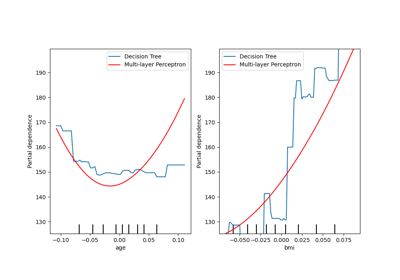sklearn.inspection.PartialDependenceDisplay¶
-
class
sklearn.inspection.PartialDependenceDisplay(pd_results, *, features, feature_names, target_idx, pdp_lim, deciles, kind='average', subsample=1000, random_state=None)[source]¶ Partial Dependence Plot (PDP).
This can also display individual partial dependencies which are often referred to as: Individual Condition Expectation (ICE).
It is recommended to use
plot_partial_dependenceto create aPartialDependenceDisplay. All parameters are stored as attributes.Read more in Advanced Plotting With Partial Dependence and the User Guide.
New in version 0.22.
- Parameters
- pd_resultslist of Bunch
Results of
partial_dependenceforfeatures.- featureslist of (int,) or list of (int, int)
Indices of features for a given plot. A tuple of one integer will plot a partial dependence curve of one feature. A tuple of two integers will plot a two-way partial dependence curve as a contour plot.
- feature_nameslist of str
Feature names corresponding to the indices in
features.- target_idxint
In a multiclass setting, specifies the class for which the PDPs should be computed. Note that for binary classification, the positive class (index 1) is always used.
In a multioutput setting, specifies the task for which the PDPs should be computed.
Ignored in binary classification or classical regression settings.
- pdp_limdict
Global min and max average predictions, such that all plots will have the same scale and y limits.
pdp_lim[1]is the global min and max for single partial dependence curves.pdp_lim[2]is the global min and max for two-way partial dependence curves.- decilesdict
Deciles for feature indices in
features.- kind{‘average’, ‘individual’, ‘both’}, default=’average’
Whether to plot the partial dependence averaged across all the samples in the dataset or one line per sample or both.
kind='average'results in the traditional PD plot;kind='individual'results in the ICE plot.
Note that the fast
method='recursion'option is only available forkind='average'. Plotting individual dependencies requires using the slowermethod='brute'option.New in version 0.24.
- subsamplefloat, int or None, default=1000
Sampling for ICE curves when
kindis ‘individual’ or ‘both’. If float, should be between 0.0 and 1.0 and represent the proportion of the dataset to be used to plot ICE curves. If int, represents the maximum absolute number of samples to use.Note that the full dataset is still used to calculate partial dependence when
kind='both'.New in version 0.24.
- random_stateint, RandomState instance or None, default=None
Controls the randomness of the selected samples when subsamples is not
None. See Glossary for details.New in version 0.24.
- Attributes
- bounding_ax_matplotlib Axes or None
If
axis an axes or None, thebounding_ax_is the axes where the grid of partial dependence plots are drawn. Ifaxis a list of axes or a numpy array of axes,bounding_ax_is None.- axes_ndarray of matplotlib Axes
If
axis an axes or None,axes_[i, j]is the axes on the i-th row and j-th column. Ifaxis a list of axes,axes_[i]is the i-th item inax. Elements that are None correspond to a nonexisting axes in that position.- lines_ndarray of matplotlib Artists
If
axis an axes or None,lines_[i, j]is the partial dependence curve on the i-th row and j-th column. Ifaxis a list of axes,lines_[i]is the partial dependence curve corresponding to the i-th item inax. Elements that are None correspond to a nonexisting axes or an axes that does not include a line plot.- deciles_vlines_ndarray of matplotlib LineCollection
If
axis an axes or None,vlines_[i, j]is the line collection representing the x axis deciles of the i-th row and j-th column. Ifaxis a list of axes,vlines_[i]corresponds to the i-th item inax. Elements that are None correspond to a nonexisting axes or an axes that does not include a PDP plot.New in version 0.23.
- deciles_hlines_ndarray of matplotlib LineCollection
If
axis an axes or None,vlines_[i, j]is the line collection representing the y axis deciles of the i-th row and j-th column. Ifaxis a list of axes,vlines_[i]corresponds to the i-th item inax. Elements that are None correspond to a nonexisting axes or an axes that does not include a 2-way plot.New in version 0.23.
- contours_ndarray of matplotlib Artists
If
axis an axes or None,contours_[i, j]is the partial dependence plot on the i-th row and j-th column. Ifaxis a list of axes,contours_[i]is the partial dependence plot corresponding to the i-th item inax. Elements that are None correspond to a nonexisting axes or an axes that does not include a contour plot.- figure_matplotlib Figure
Figure containing partial dependence plots.
See also
partial_dependenceCompute Partial Dependence values.
plot_partial_dependencePlot Partial Dependence.
Methods
plot(*[, ax, n_cols, line_kw, contour_kw])Plot partial dependence plots.
-
plot(*, ax=None, n_cols=3, line_kw=None, contour_kw=None)[source]¶ Plot partial dependence plots.
- Parameters
- axMatplotlib axes or array-like of Matplotlib axes, default=None
- If a single axis is passed in, it is treated as a bounding axes
and a grid of partial dependence plots will be drawn within these bounds. The
n_colsparameter controls the number of columns in the grid.
- If an array-like of axes are passed in, the partial dependence
plots will be drawn directly into these axes.
- If
None, a figure and a bounding axes is created and treated as the single axes case.
- If
- n_colsint, default=3
The maximum number of columns in the grid plot. Only active when
axis a single axes orNone.- line_kwdict, default=None
Dict with keywords passed to the
matplotlib.pyplot.plotcall. For one-way partial dependence plots.- contour_kwdict, default=None
Dict with keywords passed to the
matplotlib.pyplot.contourfcall for two-way partial dependence plots.
- Returns
- display
PartialDependenceDisplay
- display

